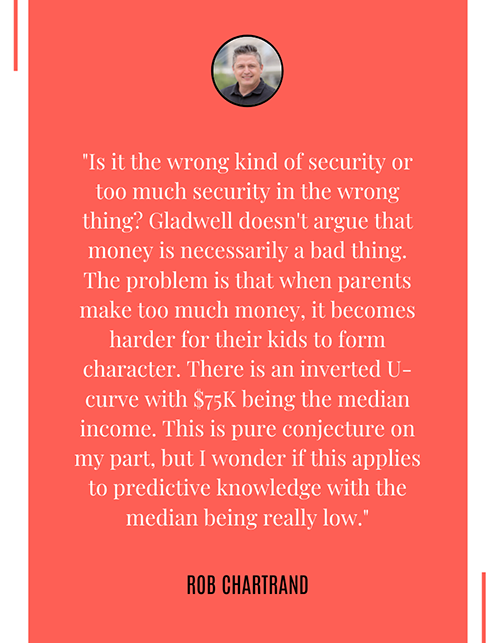Future-Proofing the Church | Nathan Weselake
This learning was written by Nathan in preparation for Season 2 of the New Waters podcast.
Future-proofing ... is this even possible?
The first ministry-related book I remember buying was an impressive collection of essays edited by David Dockery called The Challenge of Postmodernism. It was important that it look impressive, and as a 19-year-old church intern, I think I even took it to the gym. I read it while recovering between bench pressing sets. I wasn’t confident I understood all the content, but I was confident that the deeply spiritual/student athlete-side vibe I was putting out there would impress the girls on the treadmills.

While I wasn’t able to get my head around every concept in every chapter, I did absorb the central theme of the book. It became the central theme of my leadership in ministry for the next 15 years or so. It was reinforced frequently by other books, conferences, and blogs, and attained an almost mythical status.
What I had absorbed was this:
“Successful leaders (pastors) will be those who are able to leverage the unique opportunities of their current culture. However, the most successful leaders will be those who can figure out what is happening next in culture and leverage that knowledge to prepare their church.”
The vocabulary has some diversity but the narrative arc of the myth is easily recognizable for those pastors who have paid attention to leadership thinking and writing in the last few decades. The arc generally has these movements:
Our present condition: new challenges/fear of the future/lack of control. Jesus not scared of the future and is on our side. Jesus at work in culture—past, present, and future. Jesus gives us insight into trends and shifts in culture ahead of time. We then become successful leaders (the kind described above).
Let’s call this the “insider trading” narrative.
When we’re not sure what stock to buy, or the market is volatile, we know a Man on the inside. He either controls the market or knows what the market will do. We buy and sell based on his information. We reap the benefits.
For the record, this is not a small church pastor rant against leadership in general or cultural exegesis in particular. I’m attempting to be more nuanced. Jesus does want us to lead well with a strong understanding of our context, and clearly desires to prepare us for the future. There is no problem with any of that. The problem lies with the “insider trading” approach.
Here are three of the main problems as I see them.
Problem #1: Insider Trading Has Never Actually Happened

First, Jesus has not once in 15 years of ministry told me what the next big shift in culture is going to be so I can leverage it for church health or growth. My man on the inside does a poor job of communicating which stocks to buy. Or perhaps, I do a poor job of listening. Like the one time I swore I received the word, “Blackberry,” while soaking.
Nor have I had any conversations with people where they had supernatural leadership insight into an upcoming cultural trend and were able to maximize it kingdom-wise. This is not to say that some leaders don’t stumble fortuitously into the right place, at the right time, in the right way and then create a theoretical backstory which cleverly articulates what happened. The key is to understand this kind of story is that it is primarily about “what happened to them” and hardly about “what they intentionally did.”
Also not allowed to claim insider information are early adopters. These kinds of people tend to have the appearance of being futurists, when they are actually perhaps just more astute, fluid, or courageous when it comes to adapting to the world around them. For slow-moving organizations like the church, this relatively rapid adaptation can feel like anticipation. But it is adaptation. Adaptation is seeing the stock starting to rise and buying in early. Anticipation is knowing it will be turning around in a few months, going all in and hemorrhaging money for a while, and then looking like a genius. Like I was supposed to with Blackberry.
Problem #2: The Idea of “Insider Trading” Doesn’t Gel with Jesus’ Example
Jesus didn’t lead his earthly ministry relying on his precise knowledge of what was going to happen next. Yes, there are some places in the Gospels where it seems as if Jesus knows exactly what is going to happen but we understand that insight best when we see it as evidence of his Spirit-infused discernment and trust in the Father, rather than knowledge he just “has.” Plus, even if we reluctantly grant him (and good incarnational Christology points in the exact opposite direction of this) an inner omniscience switch which he flips on and off as is appropriate, we are left with times when he clearly has the switch off.

To be clear, there are times when Jesus seems to be figuring it out as he goes along. Where he lacks assuredness about what is going to happen next. Where he shows genuine surprise. Or where he clearly hasn’t covered all the bases. To see these places for what they are requires saying yes to a robust and orthodox Christology which makes visible what “insider trading” lenses blind us to.
Take an example from Luke 10, where Jesus trains and sends out the 72. A season of mentorship has brought them to a place where he can release them for mission. He gives them instructions, and off they go. And when they return we see a fist-pumping Jesus full of joy, celebration, congratulations, and excitement. His response to the disciples and his prayer hint at an emotional response which would be impossible if you were 100% sure of what was going to happen next.
Responses like “I saw Satan fall like lightning!”...”Father, Lord of heaven and earth, thank you for hiding these things from those who think themselves wise and clever, and for revealing them to the children!”...”My Father has entrusted everything to me,”...”Blessed are the eyes that see what you have seen.”
Are these not the responses of someone experiencing the relief and joy we all experience when something we weren’t sure was going to work actually does? Certain emotions are not possible when you know in detail how the future unfolds. Just ask anyone who has watched a pre-taped sporting event and knew the overtime goal was coming. Whatever they felt when they watched it, would they describe it as “life, and not just any old life, but life to the full”? Probably not. No, they missed out on something (abundance?) because they knew the future.
Why would Jesus want to rob us of the deep joy which flows out of God-orchestrated surprise? These beautiful moments are only available to us because we don’t know what is coming! Our faith and discernment may position us to experience the surprise, but they aren’t specific enough to ruin the surprise.
Problem #3: Insider Trading Inhibits Character Formation Malcolm Gladwell has pulled together a series of proverbs from various cultures to illustrate the universal struggle the rich have in raising their children to show initiative, be responsible, and manage money. It is hard to teach these because the child knows they are not necessary. They will be fine if they never become more than a coddled heir. It is counterintuitive at first, but the truth is, the wrong kind of security prevents character formation. Wise parents need to find a way to provide the right measure of security, without the over-insulation which stunts personal development.

Insider trading is the wrong kind of security. The wrong kind of security seems to be about the easy availability of power and wealth. The right kind of security is about inevitability and identity. We have to become something we are not already to access what is promised. God is going to have us become something, and He doesn’t intend to leave us as we are. He is going to have us shining like stars and will place just enough confusion in our path to ensure we grow faultless, pure, and wise enough to shine.
The Italian version of the proverb Gladwell cites tells us that the offspring of the wealthy go “from stars to stables.” Our Father is going to take us in the other direction. Our Brother Jesus’ path ensures this is inevitable. This is the kind of security we need to grow—not insulated, but protected just enough to have our character become like Christ.
This brings us to the one way I think you can future-proof your church: by first future-proofing yourself. And you can, because:
Character is future-proof.
To say that something is future-proof is to assert its adaptability, suitability, and longevity. The future-proof person won’t find themselves stuck (adaptable), irrelevant (suitable), or extinct (long-lasting). Rather, they will be what Nassim Taleb calls “antifragile”: robust and vital in the face of the adverse or the unknown. Indeed, it is in conditions of uncertainty that the person of character thrives.
The person of character is able, in times of blessing or momentum, to taste the fruit of their lives from a place of rooted humility and peace. In times of challenge, a person of strong character is able to meet the demands placed on them and provide a place of rest for others who are not as strong.
And as I write, I realize that I am more or less paraphrasing Psalm 1, which is not a bad place to end up when you are writing about church leadership. This is also a place which can help introduce us to a leadership narrative better than “insider trading.”
Your church, and your leadership, truly become future-proof when you become like a tree planted by streams of water.
The images in this psalm are not unique—they are all over in Scripture. Roots. Shelter. Shade. Rest. Strength. Timeliness. Nourishment. And yes, the antifragile trifecta of adaptability, suitability, and longevity.
These images are about character. Describing people of character, and communities of character. And these images will always be exactly what is needed to address the human heart in every time and every place. They are future-proof because character is future-proof.
People will always need shade to sit under and the future belongs to the people of God who can be the tree. That is the future-proof story to live out in your life and church.
...
But there is an endnote. And it will take us to Mark 4.
Sandwiched between two parables about seeds, fruit, soil, and harvest, Mark has Jesus offering three sayings we know are pregnant with meaning... but maybe we aren’t exactly sure what the gender of the child is yet. These sayings hint that perhaps there is something to the idea that Jesus is able, and more than willing, to give us special glimpses into what is coming in ways which prepare us uniquely to receive it.
Here’s a sampling of the text:
“He who has ears let him hear ... Everything hidden is meant to be disclosed ... The amount of attention you pay is the amount of attention you receive.”
(NT Wright’s translation.)
I’ll try to sew them together and wonder if Jesus could be saying:
“There are hidden things I intend reveal—but only to those who are ready to hear and handle them. You become the sort of person ready to hear and handle this information by paying attention to me.”
Turns out insider trading is legal in the kingdom of God and is even to be desired. But our Man on the inside waits until we have the Jesus character which can handle this Jesus power.
Character formation isn’t just more important than revelation— it leads to revelation.
Character formation isn’t just more important than influence— it is influence.


